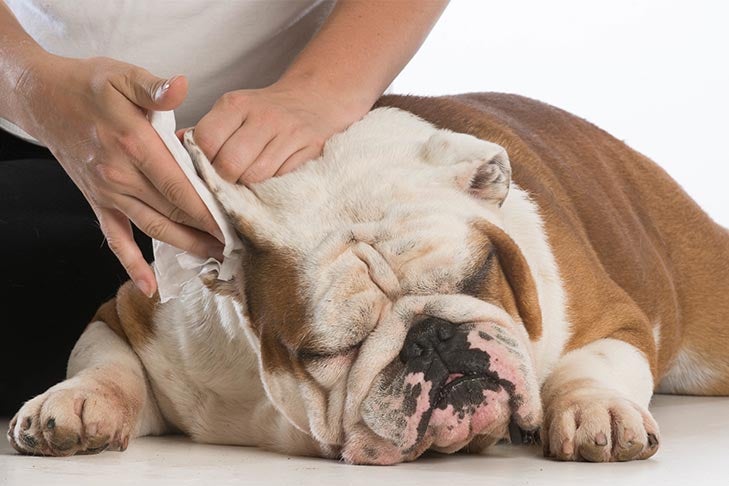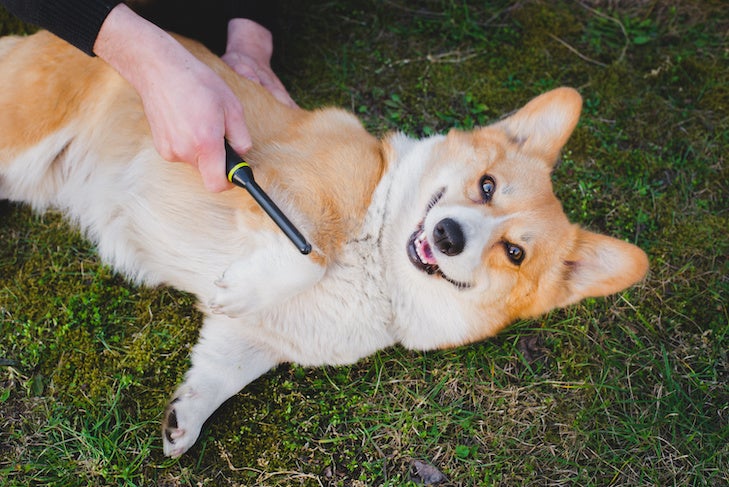AKC is a participant in affiliate advertising programs designed to provide a means for sites to earn advertising fees by advertising and linking to akc.org. If you purchase a product through this article, we may receive a portion of the sale.
Some dogs hate baths, making it challenging and time-consuming to get them clean. Bathing a dog too frequently can remove valuable oils from the skin and coat, causing dryness and irritation and reducing defenses against bacteria. Thankfully, you can learn how to wash a dog without water and how to keep your dog clean between baths.
Dry Shampoo for Dogs
Dry dog shampoo doesn’t require any rinsing, will detangle your dog’s fur, and treat your dog’s skin. You can buy dry shampoo as a foam, powder, or spray. Look for nontoxic ingredients that won’t upset your dog’s stomach when they lick themself. Keep an eye out for a formula that is pH-balanced and made specifically for dogs.

It’s a good idea to use waterless dog shampoo just once a week. You want to eliminate excess oils on your dog’s coat, but not all oils. Also, dry shampoos too often can cause the ingredients to build up and remain on the coat until you give your dog a bath with water.
How to Use Dry Shampoo for Dogs
- Brush your dog thoroughly to get rid of any loose dirt.
- Apply the dry dog shampoo to your dog’s coat (except their face). Rub the shampoo into and under the coat so it reaches the skin. Let it sit for a few minutes, and try to prevent your dog from licking it.
- Brush your dog’s fur to remove the dry shampoo. Use a towel to dry them off. It’s okay if your dog shakes their body during this process.
- After cleaning your dog’s body, it’s time to focus on the face. To use dry shampoo on the head, shield your dog’s eyes, place the dry shampoo on your hand, and rub it in small areas. Do your best to avoid getting it in the dog’s eyes, mouth, or ears.
Dog Wet Wipes
Wet wipes for dogs are an excellent way to quickly clean a messy dog. You can choose from lots of types of wipes (like unscented wet wipes for dogs, deodorizing dog wipes, and antibacterial options) for on-the-go cleaning.

How to Use Wet Wipes for Dogs
1. Begin by wiping down your dog’s paws, gently exfoliating between paw pads and toes.
2. Wet wipes are appropriate for your dog’s whole coat, so start at the neck and work your way down. Gently scrub against the natural direction of the coat to tackle underlying dirt.
3. Carefully wipe down your dog’s face with a fresh wipe. Avoid eyes, mouth, and ears.
Baking Soda for Dogs
Since baking soda kills bacteria, this household cleanser is a natural choice when deciding how to wash a dog without water. It’s a good idea to ask your vet before using it, since some dogs may be allergic to baking soda. While your dog will be okay if they ingest a small amount, it’s dangerous to eat in large amounts.
How to Use Baking Soda for Dogs
- Either use one cup of baking soda alone or combine it with one cup of cornstarch. Baking soda will deodorize your dog’s coat, while cornstarch will absorb oil and soften the coat.
- Brush your dog and sprinkle the baking soda on the coat from the neck to the tail. Massage it into your dog’s skin and let it rest for a few minutes. If your dog doesn’t like having the powder shaken onto them, try putting baking soda on a towel and then gently applying it to their coat.
- Comb or brush out your dog’s fur. Rub them down with a clean towel.

Tips and Tricks for Clean Dogs and Waterless Dog Baths
Here are some ways to keep your dog clean and ensure their “bath” is as mess-free as possible:
- Keep your dog’s environment, including their bed, crate, and blankets, clean. These areas can trap debris.
- Because your dog will want to shake out their fur often during the waterless bath, it’s a good idea to do it outside.
- As you work the dry shampoo into your dog’s fur, speak in a reassuring voice to keep them calm. When you’re finished grooming, reward them with a dog treat.
This article is intended solely as general guidance, and does not constitute health or other professional advice. Individual situations and applicable laws vary by jurisdiction, and you are encouraged to obtain appropriate advice from qualified professionals in the applicable jurisdictions. We make no representations or warranties concerning any course of action taken by any person following or otherwise using the information offered or provided in this article, including any such information associated with and provided in connection with third-party products, and we will not be liable for any direct, indirect, consequential, special, exemplary or other damages that may result, including but not limited to economic loss, injury, illness or death.

